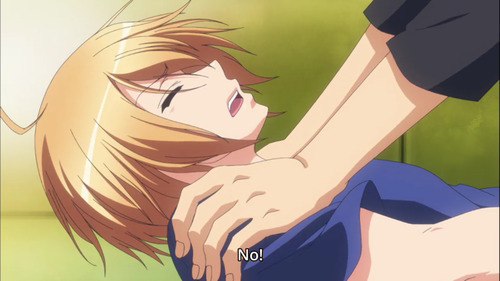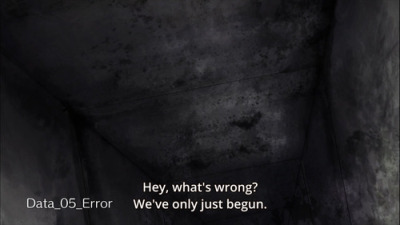

She is voiced by a man in both the Japanese and English versions. There’s only one transgender woman in the cast-an unnamed hairdresser with a stereotypical transphobic character. Implying people who try to pass as women are perverts attempting to trick men is also an argument used by transphobic people. Ryouma insults Izumi for being a “Cross-dressing pervert” as if we needed more clues he’s homophobic. Including both men being disgusted upon realizing they kissed a man. Rather than developing a realistic romance like Given and Bloom Into You, it panders to the lowest common denominator with romanticized homophobia. The absurd premise forces the ~straight~ men together like two north-pole magnets. Stereotypical portrayals of gay characters in anime have desensitized people to homophobic tropes since the inception of boys love manga. If Ryouma wasn’t a “hot” and wealthy celebrity, no one would defend their relationship. Mainstream audiences comprised of mostly straight men and women agree Love Stage is ‘pretty good for a gay anime.’ At the same time, most LGBTQ+ people strongly dislike it, as we should. Of course, all that is manipulative bullshit because he kisses Izumi while he’s sleeping in the next scene. When Izumi finally calls Ryouma a creep, he apologizes profusely, guilt-trips him, then showers him with shallow compliments until Izumi forgives him. Ryouma stalks Izumi at school and home by manipulating his family’s trust, as a child groomer would. Whereas Izumi is helpless when confronted with emotional and sexual abuse. In the traditional yaoi erotica, the seme is aggressive and creepy, Ryouma lives up to those expectations. Conversely, Ryouma assumes the dominant seme role.

Izumi is assigned the submissive uke role (he doesn’t get a choice). Note: Love Stage frustratingly never acknowledges bisexuality exists. After all, this is a boys love anime therefore, it adheres to the most toxic and homophobic cliches ingrained in the genre. They enter into a complicated relationship in which Ryouma stalks and sexually assaults Izumi until he ‘becomes gay.’ This is all framed as romantic, cute, and sexy. The two believed they were straight, but their feelings are strong enough to kindle a romance. Once they meet again, Ryouma confesses his feelings because he assumed Izumi was a woman. In the present, they reprise their roles for a new wedding commercial. When they first met, Ryouma fell in love with Izumi’s femininity and beautiful eyes. Back then, he played a girl due to his feminine features. Ten years ago, Izumi starred in a wedding commercial with Ryouma Ishijou, a now-famous actor. When I first watched Love Stage as a teen, I thought this would be a coming-of-age story about a boy who achieves his dreams and embraces his sexuality. Despite wanting to move in a separate direction, he is dragged into showbiz by his family. Izumi is an introverted otaku who dreams of becoming a famous mangaka. They constantly put pressure on him to become an entertainer, to his dismay. Izumi, the boy in question, lives with his family of actors and musicians. Once upon a time, your average ~straight~ teenage boy awakens from his bed and greets his idol, Lala Lulu. *Trigger warnings: Homophobia, transphobia, sexual assault, victim-blaming.* Happy LGBTQ+ Pride Month! In celebration, I’m reviewing one of the most beloved Shounen-ai anime from 2014.


 0 kommentar(er)
0 kommentar(er)
